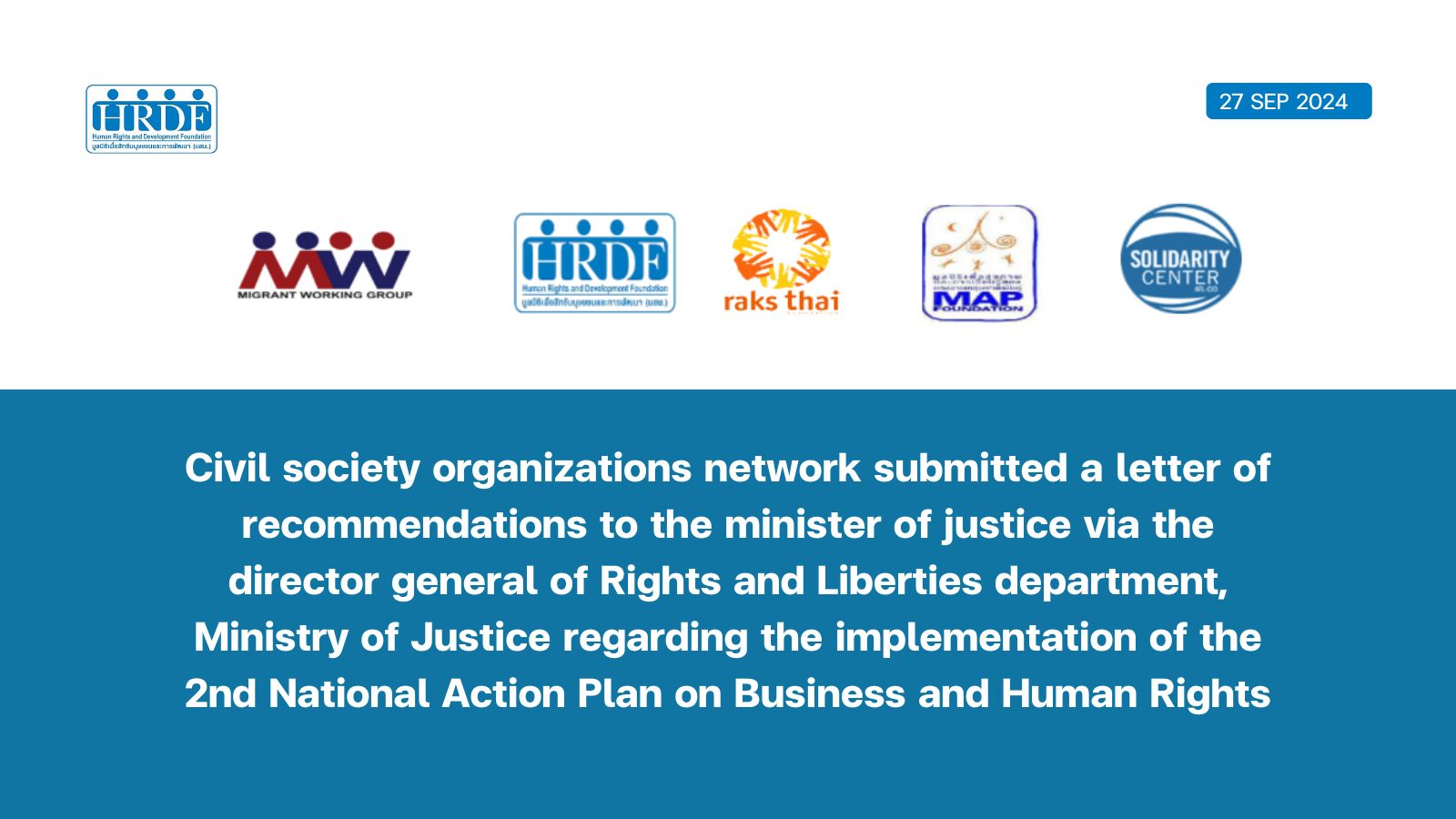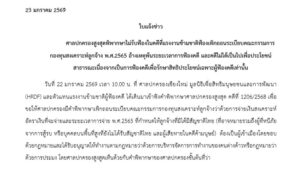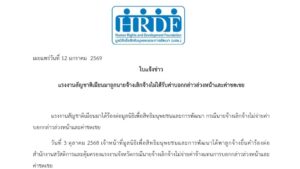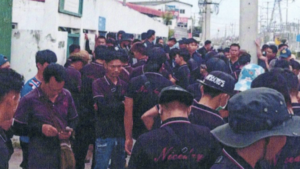
17 September 2024
Subject: Migrant Working Group’s Recommendations regarding the implementation of the 2nd National Action Plan on Business and Human Rights
Dear Minister of Justice
As the Ministry of Justice’s Rights and Liberties Protection Department has been designated to take the lead to develop and implement the 2nd National Action Plan on Business and Human Rights (2023 -2027) in compliance with the UN Guiding Principle on Business and Human Rights (UNGPs). The 2nd NAP is still focused on four key areas including labour, community, land, natural resources and the environment, human rights defenders and cross-border investment and multi-national enterprises to ensure the protection of people against human rights violation as a result of business implementation and to prevent, mitigate or address the problems or negative impacts from business operation.
The Migrant Working Group (MWG) and its alliances realize the importance of the implementation of the National Action Plan on Business and Human Rights which shall bring about the promotion, the protection and the remediation of workers and the supervision to ensure business operation shall be made based on respect and comprehensive accountability. MWG and its alliances have since organized public discussions with stakeholders including local state authorities and private sector, workers, academics and labour activists to raise the awareness and engender an understanding about the 2nd National Action Plan on Business and Human Rights (2023 – 2027) and to ensure all parties have a space in which an exchange can be made among stakeholders concerning the protection, respect and remedy. Such discussion among public authorities, business entrepreneurs, workers and civil society shall lead to a collaboration. After holding such discussions for four times in Phuket, Tak’s Mae Sot, Chiang Mai and Chiang Rai, challenges raised and Recommendations made can be presented as follows;
On protection
1. The right to organize and collective bargaining The existing laws appear to discriminate against workers regarding their nationality. As a result, non-Thai workers are still denied their right to form a labour union giving rise to rampant violation of the migrant workers’ rights since they are unable to get organized as a labour union. Such issues were raised and have led to the proposing of Recommendations to enhance the workers’ quality of life. It has led to the complaints being filed with public authorities and private agencies. Such phenomenon shall not bode well to the image of the government’s policies to promote responsible businesses.
Recommendation The effort to amend laws to ensure migrant workers have access to freedom of association and to form a labour union should be expedited in compliance with the Constitution of the Kingdom of Thailand and international treaties to which Thailand is a state party including;
- International Covenant on Economic, Social and Cultural Rights (ICESCR) Article 8 (a) “The right of everyone to form trade unions and join the trade union of his choice.”
- International Covenant on Civil and Political Rights (ICCPR), Article 22 (1) “Everyone shall have the right to freedom of association with others, including the right to form and join trade unions for the protection of his interests.”
- International Convention on the Elimination of All Forms of Racial Discrimination (ICERD), Article 5(e) Economic, social and cultural rights, and Sub-article (ii) The right to form and join trade unions
And consider to expedite the effort to sign the International Labour Organization (ILO) Conventions No. 87 on Freedom of Association and No. 98 on the Right to Organise and Collective Bargaining
2. Law concerning the management of migrant workers’ employment Both the workers and the entrepreneurs raised issues about the complex policies to manage the workers’ employment to ensure they can work and reside here legally and for the employers to be able to employ migrant workers legally. The difficulties start from the registration process which is complicated and has to be done in a short period of time. As a result, both workers and employers have been compelled to resort to services from brokers or recruitment agencies which charge them fees two or three times higher than the fees imposed by the state. As given it is a short-term employment, the workers’ documentation has to be renewed on at least a yearly basis. This makes it difficult for workers to free themselves of debt obligations since it is incumbent on them to borrow from the brokers, their close friends and their employers. Upon the completion of their registration, the workers’ personal documents are often withheld by their employers or brokers as an assurance that they will pay off their debt. In addition, unrest in the nonboring country has turned many documented workers into undocumented workers since it is not possible to apply for documents within the deadlines while no policies have been meted out to ensure the employment’s management which is compatible with the changing reality as far as the workers who are required to undergo nationality verification, MOU workers and border employment workers are concerned. All these problems tend to give rise to undocumented workers, unlawful exploitation, trafficking in person and forced labour.
Recommendations A provincial taskforce should be set up to review the management of the migrant workers’ employment in its own vicinity including the Special Economic Zone to minimize any redundancy of documentation process and to address the exorbitant fees and such taskforce shall be vested with power to offer Recommendations on the policies concerning the management of migrant workers.
3. Strategic Lawsuits against Public Participation (SLAPP) employed by both public authorities and businesses against workers or defenders of labour rights through criminal and civil suits Such litigations aim to stifle the exercise of rights and freedoms of those people including the rights and freedoms enshrined in international human rights laws. During the Covid-19 pandemic, many migrant workers were affected by massive layoff without compensation. And when filing complaints with the labour inspectors, such migrant workers could face a lawsuit filed by their employers to silence them. And they had to defend themselves until the cases against them have been dismissed by the Court. Such SLAPP lawsuits make migrant workers vulnerable in terms of their ability to demand and protect their rights through the state grievance mechanisms.
Recommendations The state should review criminal and civil laws to ensure protection of the individuals who have exercised their rights or have in good faith informed the authorities about the potential human rights violation and as a result of which they have face lawsuits filed by private or public sectors which attempt to weaponize the laws to stifle their freedom of expression. This can ensure such individuals afford protection against civil and criminal liabilities. An effort should also be made to raise the awareness of the roles of public prosecutor as far as the Public Prosecution Institution and Public Prosecutors Act is concerned to ensure they consider public interest when making a decision whether to prosecute or not prosecute a case.
On respect
1. The 2nd National Action Plan on Business and Human Rights is not legally binding.
Therefore, the government can only implement it on a cooperative basis. As a result such cooperation from private sector and state enterprises tend to concentrate among large-scale companies in the central area of the country whereas impacts of the workers from business operation can be felt nationwide.
Recommendations A taskforce should be established to promote the implementation of the National Action Plan on Business and Human Rights on labour issues at the local level consisted of all concerned stakeholders including from the state, civil society, workers, entrepreneurs, academics or lawyers in local area while the Provincial Governor should be vested with power to make the appointment and to supervise and officials from the Provincial Justice Offices be responsible as the taskforce’s secretariat. This can provide a space for an exchange on the situation of business operation and labour to explore collective solutions. It can also serve as a mechanism for collective implementation between the local and the national taskforces to advocate for policy changes and the achievement of the aims of the 2nd National Action Plan on Business and Human Rights.
2. The focus on the assessment of human rights violation risks and human rights due diligence Amidst human rights violations which in several instances related directly to the supply chain and business relationships among contractors, subcontractors, suppliers, there is still a lack of review process to ensure respect of labour rights, particularly in areas declared as the Tak Special Economic Zone.
Recommendations The state should develop a plan to collaborate with the Federation of Thai Industries and the Chamber of Commerce by signing the Memorandum of Understanding (MOU) to promote business operation based on respect of human rights. An effort should also be made to encourage members of the Federation of Thai Industries and the Chamber of Commerce to participate in the model organizations for human rights in the category of business organizations. To be eligible as a model organization, it is required to produce its human rights due diligence report[1] which applies to all business organizations in a joint venture or in the same supply chain. Such measure can prevent the unlawful exploitation of labour. Content of such report should also be disclosed to the public to raise the awareness and make it easier for verification.
On remedy
1. The Ministry of Labour’s grievance mechanisms including the Office of Labour Protection and Welfare, the Office of Employment, etc. should take the lead to receive complaints from workers whose labour rights have been violated by business sector. Nonetheless, key issues have been raised by stakeholders including the limited interpretation service, a lack of quality interpretation, a lack of review of business agencies involved with gross labour rights violation such the illegal wage deduction, document retention, even though such violations have been found to exist for a long time without sufficient effort to address them. Such problems make workers more vulnerable to forced labour or trafficking in persons.
Recommendations
- During the mediation regarding a complaint on wage deduction and document retention, a worker should afford the rights not lower than what is provided for by law. Any settlement of the complaint through such mediation shall primarily be based on the interest of the rights holders and it has to be done in light of the unequal powers between the workers and the entrepreneurs as well as public authorities involved with the procedure.
- Regarding the interpreter, language coordinator or volunteer translator, they should be required to have certain qualification including having acquired a certificate following the training on concerned topics.
- Advocate for the evaluation of the workers’ satisfaction with the state grievance mechanisms which should be available in the languages understood by migrant workers of the four nationalities. Such mechanism should also be made accessible and ensure confidentiality of information of the evaluators while the issues of evaluation should include the quality of the services provided by language coordinator, interpreter, and volunteer translator of each of the agencies.
- The state should allocate resources to ensure the recruitment of interpreters to serve at each of the agencies which handle cases of migrant workers including the Office of Employment, the Office of Labour Protection and Welfare, the Social Security Office, hospitals, the Immigration Bureau, etc.
2. Burden of proof of the workers or descendants and their access to remedy The workers have raised the issues concerning the delayed access to remedy including access to the Employee Welfare Fund, the Justice Fund, the Social Security Fund which require that they have to produce more documents than their Thai counterparts. The existing procedure is also not convenient for the workers or fails to be revised in light of the situations in the country of origin of the workers. The workers are still required to pay expensive fees to obtain their documentation. In addition, rules at the practical level of the authorities vary at each locality.
3. Guidelines issued by public authorities that impede access to remedy Such cases are common regarding access to remedy from the like of the Social Security Fund, the Workmen’s Compensation Fund, the Employee Welfare Fund, and the Justice Fund. It is attested to by the latest court verdict in August 2024 which states that internal guidelines which impose the qualification of migrant worker appears to impede their access and not lawful. For example, the Social Security Office’s guidelines including the circular no. Ror Ngor 0607/W987 dated 31 May 2012 on the protection of migrant workers suffering an accidence or getting ill from work requires that in order to access the Workmen’s Compensation Fund, a migrant worker who suffers from such work-related danger or sickness has to produce their registration documents and work permit and has to be granted legal entry to the country or has undergone nationality verification pursuant to the cabinet resolution on 13 February 2012. Without such documents, the employer shall be liable to pay the compensation according to the Workmen’s Compensation Fund Act. The Court found such guidelines unlawful.
Recommendations Review the enforcement of laws, policies, guidelines or criteria which apply to the eligibility of the workers or their descendants to gain access to the remedy in order to standardize such guidelines while minimizing the redundancy of the process for such access, to minimize documentary burden based on the understanding of the restrictions in the country of origin of the workers.
For more information, please contact Ms. Phenpiccha Jankomol, 096-364-4697
[1] http://www.nhrc.or.th/getattachment/5b8db0f0-ee83-4987-9fe8-583160dc8005/.aspx




